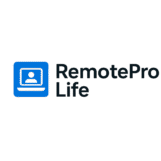
The dream of working from anywhere in the world is more appealing than ever. But what if you’re just starting out? The idea of landing a remote job with no experience can feel like a paradox. How can you get experience if no one gives you a chance?
The good news is that it’s not only possible but increasingly common. Companies are building distributed teams and value skills, motivation, and cultural fit over a traditional resume. This guide will provide a step-by-step roadmap to secure your first remote role and, crucially, lay the foundation to grow into a senior position.
Why Remote Work is a Viable Starting Point
Many people assume you need years of office experience before working remotely. The truth is, starting your career remotely offers unique advantages:
Skill-First Focus: Remote hiring often prioritizes demonstrable skills over pedigree. A strong portfolio can outshine a degree.
Global Opportunities: No location barriers—you can work with startups in Berlin, agencies in Singapore, or tech giants in California.
Accelerated Growth: Remote work teaches independence, communication, and time management from day one—skills crucial for senior roles.
📌 Visual Suggestion: Infographic — “3 Reasons Why Starting a Remote Career is a Smart Choice”.
Phase 1: The Foundation – Preparing for Your First Remote Job
Before applying, you need a compelling case for why you’re a great hire without formal experience.
Identify Your Target and Transferable Skills
Don’t just apply to “remote jobs.” Be specific.
Choose a Role: Common beginner-friendly roles include Digital Marketing Assistant, Customer Support, Data Entry, Software Development, Virtual Assistance, and Content Writing.
Audit Your Skills: You already have more experience than you think.
Managed a social media account? → That’s community management.
Organized events? → That’s project coordination.
Helped friends with tech issues? → That’s customer support.
👉 Read: How to Build a Strong Online PortfolioHow to Build a Strong Online Portfolio and Land High-Paying Freelance Projects
Build a Portfolio, Not Just a Resume
For a remote job with no experience, your portfolio is your mosWorker ful weapon. It’s proof of your capabilities.
· Create Sample Projects: If you want to be a writer, start a blog or write guest posts. For a designer, create mock redesigns of websites or logos. For a marketer, run a small ad campaign for a fictional product and document the results.
· Contribute to Open-Source Projects: This is gold for developers. It shows you can collaborate on a remote team.
· Use Free Tools: Build your portfolio on WordPress, GitHub, Notion, or a simple PDF. The goal is to have a URL to share that says, “I can do this job.”
👉 Read:
Develop the "Remote Mindset" Skills
Companies need to trust that you’ll be productive unsupervised. Highlight these traits:
· Proactive Communication: Don’t wait to be told what to do. Ask questions, provide updates, and clarify expectations.
· Time Management & Self-Discipline: Use tools like Todoist or Google Calendar to structure your day.
· Asynchronous Communication Mastery: Learn to write clear, concise messages and documentation that can be understood without a live meeting.
Phase 2: The Hunt - Finding and Applying for Roles
Where to Look for Entry-Level Remote Jobs
Remote-First Job Boards: Sites like Remote.co, We Work Remotely, JustRemote, and Remotive are curated for remote opportunities.
· LinkedIn: Use the “Remote” location filter. Use keywords like “entry-level,” “junior,” “associate,” and “trainee.”
· Company Career Pages: Follow companies known for being remote-first (e.g., GitLab, Zapier, Doist, Automattic). Apply directly.
Crafting an Application That Gets Noticed
Your application must overcome the “no experience” objection immediately.
· The Cover Letter is Key: Don’t rehash your resume. Tell a story. Start with: “Although my resume may not show traditional experience, my portfolio demonstrates my direct ability to [achieve a key task for the job].” Then, link to your portfolio.
· Optimize Your Resume for ATS (Applicant Tracking Systems): Use keywords from the job description. Instead of “Job at Retail Store,” frame it as “Developed customer service and conflict-resolution skills in a fast-paced environment.”
· A Personal Project or Website: Having your own domain (e.g., yourname.com) shows initiative and technical savvy.
Phase 3: The Interview - Proving You're Remote-Ready
The interview is where you prove you have the remote mindset.
Preparing for Common Remote Interview Questions
How do you manage your time and priorities?” Talk about your system (e.g., “I use the Eisenhower Matrix to prioritize tasks and time-blocking for deep work.”).
· “Describe how you handle a situation where you are stuck on a task.” Your answer should highlight proactive communication: “First, I’d consult our internal documentation. If I can’t find an answer, I’d message my team lead on Slack with a clear description of the problem and what I’ve already tried.”
· “Why do you want to work remotely?” Focus on productivity and work-life integration, not just “flexibility.” Say, “I do my best work in a quiet environment and appreciate the autonomy to structure my day for maximum productivity.”
The Technical Setup
Test your internet connection, webcam, and microphone beforehand. Choose a clean, professional background. A smooth technical experience subconsciously signals competence.

Phase 4: The Ascent - How to Grow to a Senior Remote Position
Landing the job is just the beginning. Growing to a senior role remotely requires intentionality.
Master the Art of Remote Visibility
Out of sight cannot mean out of mind. You need to be strategically visible.
· Over-Communicate (Professionally): Provide regular status updates. In meetings, be prepared and contribute valuable points.
· Be Present on Communication Channels: Engage in non-work related channels (like #random or #pets) to build rapport. It’s the virtual water cooler.
· Document Your Work: Write clear summaries after completing projects. This creates a record of your achievements and helps others.
Take Ownership and Initiative
Seniority is about solving problems, not just completing tasks.
· Identify Gaps: See a process that’s inefficient? Propose a better way.
· Volunteer for Challenges: Raise your hand for new projects, especially ones that are slightly outside your comfort zone.
· Become a Go-To Expert: Deepen your knowledge in a specific area relevant to your team (e.g., a specific software tool, a marketing channel, a coding framework).
Seek Out Mentorship and Feedback
Proactive growth is key.
· Schedule Regular 1:1s: Use your time with your manager not just for status updates, but to ask for feedback and discuss your career goals.
· Find a Mentor: Identify a senior colleague you admire and ask if they’d be open to occasional mentorship.
· Request 360-Degree Feedback: Ask peers and other team members you work with for constructive criticism.
Develop Leadership and Mentorship Skills
Senior growth is about elevating others.
· Mentor New Hires: Once you’re settled, offer to help onboard new team members. This demonstrates leadership.
· Share Knowledge: Host a brown-bag lunch session on something you’ve learned. Create documentation that helps the team.
· Improve Team Culture: Suggest virtual team-building activities. Be a positive, supportive force on the team.
Conclusion: Your Remote Career Journey Starts Now
The path from no experience to a senior remote role is a marathon, not a sprint. It demands self-awareness, relentless skill-building, and a proactive approach to your career. Start today by defining your target, building a small but powerful portfolio, and embracing the remote mindset. Your first remote job is the crucial first step in a rewarding career defined by freedom, growth, and global impact. The future of work is remote, and you have the opportunity to build your place in it from the ground up.
Frequently Asked Questions (FAQ)
1. What are the easiest remote jobs to get with no experience?
Some roles have a lower barrier to entry because they rely heavily on soft skills and can be learned quickly. These include:
· Customer Support Representative: Companies need people who are empathetic, good communicators, and problem-solvers.
· Data Entry Clerk: Requires attention to detail and basic computer skills.
· Virtual Assistant: Tasks can include email management, scheduling, and social media posting.
· Content Moderator: Reviewing user-generated content for policy violations.
2. How important is a home office setup for an entry-level remote job?
For an entry-level role, professionalism during video calls is essential. You don’t need a expensive setup, but you do need:
· A reliable internet connection.
· A quiet space with a neutral background.
· A decent webcam and microphone (many headphones have good mics).
As you grow in your career,investing in a better chair, monitor, and lighting will improve your comfort and productivity.
3. How can I prove I'm disciplined enough for remote work without prior experience
Point to examples from your life:
· “I successfully completed an online certification while balancing other commitments, which required strict time management.”
· “I managed a personal project (like my blog/portfolio) from start to finish, meeting my own deadlines.”
· During a trial task in the hiring process, deliver exceptional work ahead of the deadline.
4. Is it harder to get promoted when working remotely?
It can be if you are not proactive about visibility. However, it can also be easier because output and results are more measurable than in an office where “face time” can be mistaken for productivity. By consistently documenting your achievements, taking ownership of projects, and communicating your impact, you can make a compelling case for promotion.
: 5. What is the biggest mistake beginners make when applying for remote jobs?
The biggest mistake is sending generic, copy-pasted applications. Hiring managers can spot them instantly. The second biggest mistake is not having a portfolio. Tailor every application, mention the company by name, and always, always link to work that proves you can do the job.
